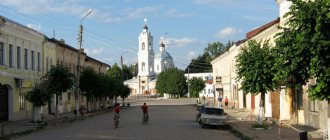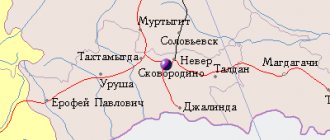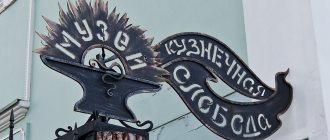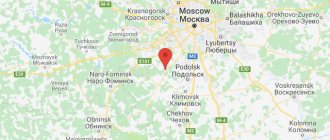ARMORS
BRONNITSY, a city in Russia, in the central part of the Moscow region, the center of the urban district of the same name. Population 22.5 thousand people. (2019). Located on the high left bank of the river. Moscow (pier), 11 km from the railway station of the same name.
Story
First mentioned in 1453 as s. Bronnichi in the spiritual letter of the Grand Duchess of Moscow Sofia Vitovtovna, wife of Vasily I Dmitrievich. The name, according to legend, is due to the fact that armor masters lived here, making armor and chain mail. According to another version, the name means a place of frequent battles (“battles”) with the Mongol-Tatars. Apparently, already from the 16th century. was the royal estate. There was a royal stud farm in Bronnitsy (no later than 1634–1845); in 1706 Peter I transferred it, along with the assigned peasants, to the personal possession of the prince. A.D. Menshikov, by decree of Emperor Peter II in 1728, the plant was again transferred to the department of the palace Stables department. In 1781–1924 Bronnitsy was a district town in the Moscow province. The economic activities of the population were associated with meeting local demand and servicing the Moscow-Kolomna trade route. In 1929–59 the regional center of the Moscow region (in 1959–60 as part of the Lyubertsy district, in 1960–92 – in the Ramensky district). Since 1992, it has been a city of regional subordination, the center of the urban district of the same name.
Architecture
Photo by A. I. Nagaev Bronnitsa. Cathedral of the Archangel Michael (1696–1705) and the bell tower (mid-19th century) in the central square of the city.
The regular layout of the 18th century has been preserved in Bronnitsy. with a rectangular street network. To the center. square - the 5-domed pillarless Cathedral of the Archangel Michael (1696–1705) with a refectory (rebuilt in 1865), combining the type of a posad church with the decorative elements of Moscow. Baroque (in the interior, stucco cartouches are framed by picturesque panels; icons by T. I. Filatiev were transferred to the Museum of Ancient Russian Art named after St. Andrei Rublev); classic the Church of St. John the Merciful (Entry of Jerusalem; early 1840s, architect A. M. Shestakov) and the bell tower (mid-19th century, architect V. I. Bove). The complex of barracks for the cavalry regiment, forming a square with corner and entrance pavilions, was built in the Empire style (1st half of the 19th century). In 1999, a memorial park was created on the site of the demolished cemetery, the tombstone of A. S. Pushkin’s grandson, A. A. Pushkin (1863–1916), who served as the leader of the Bronnitsy district zemstvo government (1894–1916), and the Bronnitsy district leader of the nobility (1896–1909), was restored ). His bust (sculptor M. G. Salman) was installed in the same year in front of the city administration building.
Centers of science and culture
Research Institute of Automotive Technology No. 21 of the Ministry of Defense of the Russian Federation. Branch of the Moscow Automobile and Highway Institute. Museum of City History (1998).
Farm
Jewelry production (the largest enterprise in the city is Bronnitsky Jeweler), woodworking, light and food industries.
Neighborhood
Near the city, in the village. Markovo (in the 17th century, the patrimony of the Odoevsky princes), - Kazan Church (1672–80, architect, possibly P. P. Potekhin), single-domed, surrounded on 3 sides by covered porches, decorated with tiles and white stone carvings (later rebuilt, decoration the interior was made by masters of the Armory Chamber; the iconostasis with icons from the 1st half of the 18th century; the chapel iconostasis - in the Museum of Ancient Russian Art named after St. Andrei Rublev). In the village Krivtsy (at the beginning of the 18th century, the possession of Prince M.A. Volkonsky) - Smolensk Church (1708) in the Moscow Baroque style, of the “octagon on a quadrangle” type, with white stone carved decoration, carved iconostasis (beginning of the 18th century, with renovations in the 19th and 20th centuries). Near the city there are the estates Denezhnikovo in the style of classicism (created in the last quarter of the 18th century by the owner I.L. Talyzin and his heirs) and Avdotino (the estate of the enlightener N.I. Novikov). The Decembrists M.A. Fonvizin (1853–54) and I.I. Pushchin (1857–59) lived in the Maryino estate; both were buried in Bronnitsy near the walls of the Cathedral of the Archangel Michael.
List of streets, alleys and passages of Bronnitsy
Streets
| Lanes
| Directions
|
Links
Moscow region Urban districts Balashikha • Bronnitsy • Vlasikha (ZATO) • Voskhod (ZATO) • Dzerzhinsky • Dolgoprudny • Domodedovo • Dubna • Yegoryevsk • Zhukovsky • Zvenigorod • Star City (ZATO) • Ivanteevka • Kashira • Kolomna • Korolev • Kotelniki • Krasnoarmeysk • Krasnoznamensk (ZATO) • Lobnya • Losino-Petrovsky • Lytkarino • Molodezhny (ZATO) • Mytishchi • Ozyory • Orekhovo-Zuevo • Podolsk • Protvino • Pushchino • Reutov • Roshal • Serebryanye Prudy • Serpukhov • Fryazino • Khimki • Chernogolovka • Elektrogorsk • Elektrostal • Shakhovskaya
Excerpt characterizing Bronnitsy
Pierre gradually began to come to his senses and look around the room where he was and the people in it. Around a long table covered in black sat about twelve people, all in the same clothes as those he had seen before. Pierre knew some of them from St. Petersburg society. An unfamiliar young man sat in the chair, wearing a special cross around his neck. On the right hand sat the Italian abbot, whom Pierre had seen two years ago at Anna Pavlovna's. There was also one very important dignitary and a Swiss tutor who had previously lived with the Kuragins. Everyone was solemnly silent, listening to the words of the chairman, who was holding a hammer in his hand. There was a burning star embedded in the wall; on one side of the table there was a small carpet with various images, on the other there was something like an altar with a Gospel and a skull. Around the table there were 7 large, church-like candlesticks. Two of the brothers brought Pierre to the altar, put his legs in a rectangular position and ordered him to lie down, saying that he was throwing himself towards the gates of the temple. “He must get a shovel first,” one of the brothers said in a whisper. - A! completeness please,” said another. Pierre, with confused, myopic eyes, disobeying, looked around him, and suddenly doubt came over him. "Where I am? What am I doing? Are they laughing at me? Will I be ashamed to remember this? But this doubt lasted only for an instant. Pierre looked back at the serious faces of the people around him, remembered everything he had already gone through, and realized that he could not stop halfway. He was horrified by his doubt and, trying to evoke in himself the former feeling of tenderness, he threw himself towards the gates of the temple. And indeed a feeling of tenderness, even stronger than before, came over him. When he had been lying there for some time, they told him to get up and put on him the same white leather apron that the others were wearing, they gave him a shovel and three pairs of gloves, and then the great master turned to him. He told him to try not to stain the whiteness of this apron, which represents strength and purity; then about the unknown shovel he said that he should work with it to cleanse his heart from vices and condescendingly smooth over the heart of his neighbor with it. Then about the first men’s gloves he said that he could not know their meaning, but must keep them, about other men’s gloves he said that he should wear them in meetings, and finally about the third women’s gloves he said: “Dear brother, and these women’s gloves are for you.” the essence is determined. Give them to the woman you will honor the most. With this gift, assure the one whom you choose as a worthy stonemason of the integrity of your heart.” And after being silent for a while, he added: “But be careful, dear brother, that these gloves are not adorned by unclean hands.” While the great master uttered these last words, it seemed to Pierre that the chairman was embarrassed. Pierre became even more embarrassed, blushed to the point of tears, like children blush, began to look around restlessly, and an awkward silence ensued. This silence was interrupted by one of the brothers, who, leading Pierre to the carpet, began to read from a notebook an explanation of all the figures depicted on it: the sun, the moon, the hammer. a plumb line, a shovel, a wild and cubic stone, a pillar, three windows, etc. Then Pierre was assigned his place, they showed him the signs of the box, said the opening word and finally allowed him to sit down. The Great Master began to read the charter. The charter was very long, and Pierre, from joy, excitement and shame, was not able to understand what was being read. He listened only to the last words of the charter, which he remembered. “In our temples we do not know other degrees,” the great master read, “except those that are between virtue and vice. Beware of making any distinction that might violate equality. Fly to the aid of your brother, no matter who he is, guide the erring one, lift up the falling one, and never harbor anger or enmity against your brother. Be kind and friendly. Stir up the fire of virtue in all hearts. Share your happiness with your neighbor, and may envy never disturb this pure pleasure. Forgive your enemy, do not take revenge on him, except by doing him good. Having thus fulfilled the highest law, you will find traces of the ancient majesty you have lost.” He finished and, standing up, hugged Pierre and kissed him. Pierre, with tears of joy in his eyes, looked around him, not knowing how to respond to the congratulations and renewal of acquaintances with whom he was surrounded. He did not recognize any acquaintances; in all these people he saw only brothers with whom he was eager to get down to business. The great master slammed his hammer, everyone sat down, and one read a lesson on the need for humility. The great master offered to perform the last duty, and an important dignitary, who bore the title of alms collector, began to make the rounds of the brothers. Pierre wanted to write down all the money he had on the alms sheet, but he was afraid to show pride by doing so, and he wrote down the same amount as others wrote down. The meeting was over, and upon returning home, it seemed to Pierre that he had come from some long journey, where he had spent dozens of years, had completely changed and fell behind the previous order and habits of life. The next day after being admitted to the lodge, Pierre sat at home, reading a book and trying to understand the meaning of the square, which depicted God on one side, moral on the other, physical on the third, and mixed on the fourth. From time to time he looked up from the book and the square and in his imagination made up a new life plan for himself. Yesterday in the box he was told that a rumor about a duel had reached the sovereign's attention, and that it would be more prudent for Pierre to leave St. Petersburg. Pierre intended to go to his southern estates and take care of his peasants there. He was joyfully pondering this new life when Prince Vasily suddenly entered the room. – My friend, what have you done in Moscow? Why did you quarrel with Lelya, mon сher? [my dear?] “You are mistaken,” said Prince Vasily, entering the room. “I found out everything, I can tell you correctly that Helen is innocent before you, like Christ before the Jews.” - Pierre wanted to answer, but he interrupted him. “And why didn’t you address me directly and simply as a friend?” “I know everything, I understand everything,” he said, “you behaved as befits a person who values his honor; It may be too hasty, but we won’t judge that. Just remember the position in which you place her and me in the eyes of the whole society and even the court,” he added, lowering his voice. – She lives in Moscow, you are here. Remember, my dear,” he pulled him down by the hand, “there is one misunderstanding here; I think you feel it yourself. Write a letter with me now, and she will come here, everything will be explained, otherwise I’ll tell you, you can get hurt very easily, my dear. Prince Vasily looked at Pierre impressively. “I know from good sources that the Empress Dowager takes a keen interest in this whole matter.” You know, she is very merciful to Helen. Several times Pierre was going to speak, but on the one hand, Prince Vasily did not allow him to do so, on the other hand, Pierre himself was afraid to start speaking in that tone of decisive refusal and disagreement in which he firmly decided to answer his father-in-law. In addition, the words of the Masonic charter: “be kind and friendly” came to his mind. He winced, blushed, stood up and fell down, working on himself in the most difficult task in his life - to say something unpleasant to a person’s face, to say something that was not what this person, no matter who he was, expected. He was so accustomed to obeying this tone of Prince Vasily’s careless self-confidence that even now he felt that he would not be able to resist it; but he felt that his entire future fate would depend on what he said now: whether he would follow the old, former road, or along that new one, which was so attractively shown to him by the Masons, and on which he firmly believed that will find rebirth to a new life. “Well, my dear,” said Prince Vasily jokingly, “tell me: “yes,” and I will write to her on my own behalf, and we will kill the fat calf.” - But Prince Vasily did not have time to finish his joke, when Pierre, with a fury in his face that reminded him of his father, without looking into the eyes of his interlocutor, said in a whisper: - Prince, I did not invite you to my place, go, please, go! “He jumped up and opened the door for him. “Go,” he repeated, not believing himself and rejoicing at the expression of embarrassment and fear that appeared on Prince Vasily’s face. - What happened to you? You are sick? - Go! – the trembling voice spoke again. And Prince Vasily had to leave without receiving any explanation. A week later, Pierre, having said goodbye to his new friends, the Freemasons, and leaving them large sums of alms, left for his estates. His new brothers gave him letters to Kyiv and Odessa, to the Freemasons there, and promised to write to him and guide him in his new activities. The affair between Pierre and Dolokhov was hushed up, and, despite the sovereign’s then strictness regarding duels, neither both opponents nor their seconds were harmed. But the story of the duel, confirmed by Pierre’s breakup with his wife, became public in society. Pierre, who was looked upon condescendingly and patronizingly when he was an illegitimate son, who was caressed and glorified when he was the best groom of the Russian Empire, after his marriage, when brides and mothers had nothing to expect from him, lost greatly in the opinion of society, especially that he did not know how and did not want to curry public favor. Now he alone was blamed for what had happened, they said that he was a stupid jealous person, subject to the same fits of bloodthirsty rage as his father. And when, after Pierre’s departure, Helen returned to St. Petersburg, she was not only cordially, but with a touch of respect for her misfortune, received by all her acquaintances. When the conversation turned to her husband, Helen adopted a dignified expression, which she, although not understanding its meaning, with her characteristic tact, adopted for herself. This expression said that she decided to endure her misfortune without complaining, and that her husband was a cross sent to her from God. Prince Vasily expressed his opinion more openly. He shrugged his shoulders when the conversation turned to Pierre, and, pointing to his forehead, said: “Un cerveau fele – je le disais toujours.” [Half-crazy - I always said that.] “I said in advance,” Anna Pavlovna said about Pierre, “I said right then, and before everyone else (she insisted on her primacy), that this is a crazy young man, spoiled by the depraved ideas of the century. I said this back then, when everyone admired him and he had just arrived from abroad, and remember, one evening I thought he was some kind of Marat. How did it end? I didn’t want this wedding then and predicted everything that would happen. Anna Pavlovna continued to host such evenings on her free days as before, and those that she alone had the gift of arranging, evenings at which she gathered, firstly, la creme de la veritable bonne societe, la fine fleur de l' essence intellectuelle de la societe de Petersbourg, [the cream of a truly good society, the color of the intellectual essence of St. Petersburg society,] as Anna Pavlovna herself said. In addition to this refined choice of society, Anna Pavlovna’s evenings were also distinguished by the fact that every time at her evening Anna Pavlovna presented her society with some new, interesting face, and that nowhere, as at these evenings, was the degree of the political thermometer expressed so clearly and firmly, on which the mood of the court legitimist St. Petersburg society stood. At the end of 1806, when all the sad details had already been received about Napoleon’s destruction of the Prussian army near Jena and Auerstätt and about the surrender of most of the Prussian fortresses, when our troops had already entered Prussia, and our second war with Napoleon began, Anna Pavlovna gathered at her place evening. La creme de la veritable bonne societe [The cream of real good society] consisted of the charming and unhappy Helene, abandoned by her husband, from MorteMariet, the charming Prince Hippolyte, who had just arrived from Vienna, two diplomats, an aunt, one young man who enjoyed living room with the name simply d'un homme de beaucoup de merite, [a very worthy person], one newly granted maid of honor with his mother and some other less noticeable persons. The person with whom Anna Pavlovna treated her guests like a novelty that evening was Boris Drubetskoy, who had just arrived as a courier from the Prussian army and was an aide-de-camp to a very important person.








